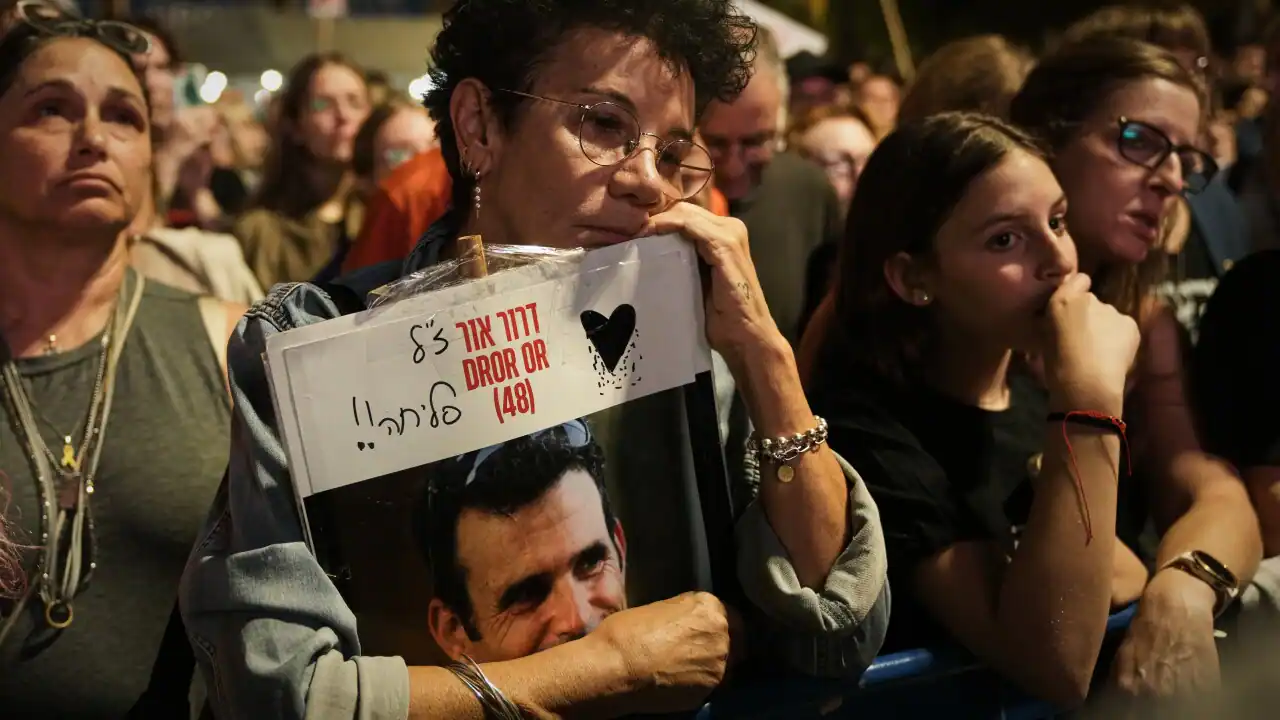Copyright sbs

The Israeli military identified the body handed over on Friday (local time) as that of volunteer ambulance driver Lior Rudaeff, who was killed in the October 7 attack. The Israeli-Argentinian was 61 at the time of the bloody cross-border attack and one of five armed civilians killed while trying to defend his community, the Nir Yitzhak kibbutz. His death was confirmed by Israeli authorities in May 2024 and his name was put on the list of 20 living and 28 dead former hostages that Hamas agreed to return under the terms of the October ceasefire . The Hostages and Missing Families Forum, a campaign group representing the Israeli families caught up in the crisis, welcomed Rudaeff's homecoming. "Lior's return provides some measure of comfort to a family that has lived with agonising uncertainty and doubt for over two years," it said. "We will not rest until the last hostage is brought home." Five more bodies remain to be returned — those of three Israelis and one Thai national seized in the October 7 attack, and that of Israeli officer Hadar Goldin, who died in combat in 2014 during a previous Gaza conflict. Several Israeli networks, including Channel 12, cited Hamas sources in reporting that the group had recovered Goldin's remains in a tunnel in a part of the southern city of Rafah under Israeli army control. Hamas has issued no official comment. Israel's military chief lieutenant general Eyal Zamir met with Goldin's family on Saturday and "updated them on the information known to the IDF so far", the military said, without specifying what the information was. Zamir "emphasised his commitment and the IDF's commitment to bringing back Hadar and all the fallen hostages", it added. At the start of the truce last month, Hamas quickly returned 20 surviving hostages and Israel released hundreds of Palestinian detainees. Under the stark mathematics of the ceasefire deal, for every dead Israeli hostage returned the bodies of 15 slain Palestinians are handed back. Accordingly, on Saturday the Nasser Medical Centre in Khan Yunis announced the "arrival of the bodies of 15 martyrs from the Gaza Strip which had been held" by Israel -- bringing the number returned to 300. The Palestinian bodies were returned to the hospital by the Red Cross, as in previous transfers. The Palestinian remains have been returned unidentified and many have been consigned to mass graves. Gaza's health ministry said that among the 300 bodies received, only 89 have been identified so far. The 15 received on Saturday "had gunshot wounds ... and signs suggesting injuries caused by explosions", said Ahmed Dhair, head of a committee to receive the bodies. Agence France-Presse footage showed medics at Nasser Medical Centre bringing the corpses in large white body bags. Israeli settlers attacked a group of Palestinian villagers, activists and journalists on Saturday who had gathered during an attempt to harvest olives near a settler outpost in the Israeli-occupied West Bank, witnesses said. Two Reuters news agency employees — a journalist and a security adviser accompanying her — were among those injured in the attack by the men who wielded sticks and clubs and hurled large rocks, in an area close to the Palestinian village of Beita. The area, lying south of the West Bank city of Nablus, has in past years been a flashpoint for settler attacks, which increased across the West Bank after the war in Gaza began two years ago. Such attacks have escalated during this year's olive harvest, which began in October. As the number of such attacks has climbed, Israeli and other activists have often joined Palestinians to support them and their right to harvest their olive groves, while also documenting any violence. Activists or local Palestinians often inform journalists of harvesting plans, so they can attend to report, particularly in flashpoint areas, such as outposts. Settler outposts, which can include a collection of caravans or sturdier structures, do not have approval by the Israeli authorities. Palestinians and most nations regard any settlements as illegal under international law. Israel disputes this. The Israel Defense Forces said they had dispatched soldiers to the scene after receiving what they described as reports of a confrontation. Witnesses said they saw no Israeli soldiers at the scene. Israeli settlers carried out at least 264 attacks in the West Bank against Palestinians in October, the biggest monthly total since UN officials began tracking such incidents in 2006, according to a UN report released on Friday. Israeli rights groups say such incidents are rarely investigated by the Israeli authorities and perpetrators are rarely held to account. download our app subscribe to our newsletter



